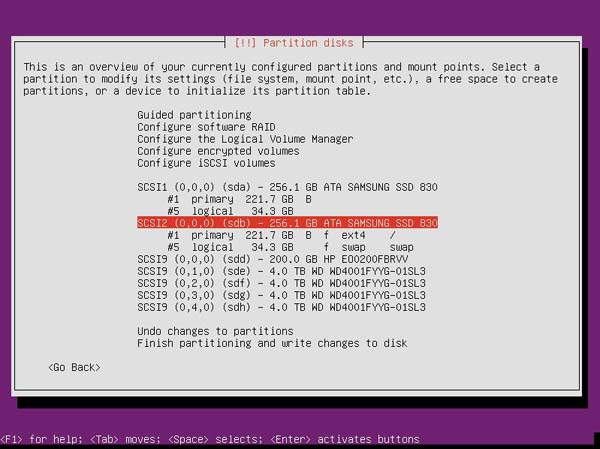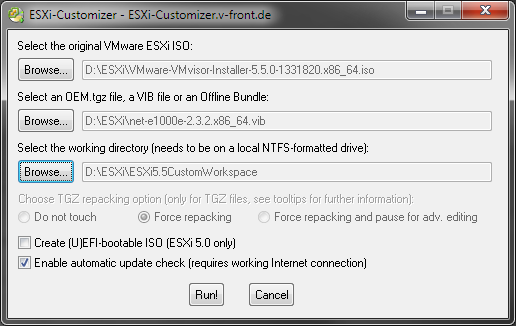Install Esxi Software Raid Ubuntu
Aug 8, 2013 - This article was written by Kent Baxley, Software Engineer at Canonical. Installing Ubuntu Server on Dell PowerEdge and PowerEdge-C servers that utilize Intel Matrix RAID arrays (BIOS/FW Raid - Intel Corporation Patsburg SATA RAID Controller) can be a tricky and sometimes frustrating. A quick guide to install Ubuntu server with software RAID 1. From a previous Windows Server installation. Ubuntu RAID 1. VMware ESXi and Ubuntu 16.04 on. Ok, so as the title explains. My overall goal is map 4 1.5TB Drives to a Ubuntu LTS 10.04 VM, and create a software based raid 5 array and host that to the.
Hindi Serial Injection Scene. In a word, no. Essentially, if you present two disks to ESX, they'll show up as candidates to be local datastores - which, in turn could then be VMFS formatted and used to store VMs. They cannot be put into any kind of RAID array.
When you present a disk to a VM, unless you're passing the disks through to the VM, it is simply a.vmdk file on the datastore. So if you give a VM two harddrives, those are two vmdk files on disk. If your hardware supports it and you passthrough the disk controller to the VM, then the VM will see the controller and could do its own RAID. Again though, ESX will not be handling the disks in any kind of RAID capacity - essentially just forwarding the controller to the VM. To circle back completely here. What is your actual, intended design goal here? Why not use the motherboard RAID controller?
In a word, no. Essentially, if you present two disks to ESX, they'll show up as candidates to be local datastores - which, in turn could then be VMFS formatted and used to store VMs. They cannot be put into any kind of RAID array. When you present a disk to a VM, unless you're passing the disks through to the VM, it is simply a.vmdk file on the datastore. So if you give a VM two harddrives, those are two vmdk files on disk.
If your hardware supports it and you passthrough the disk controller to the VM, then the VM will see the controller and could do its own RAID. Again though, ESX will not be handling the disks in any kind of RAID capacity - essentially just forwarding the controller to the VM. To circle back completely here. What is your actual, intended design goal here? Why not use the motherboard RAID controller?
Sadly you will need a HW Raid controller to handle all of that, there are some cheap alternatives for HW Raid that can give a good amount of I/O for what u need. I have been using Dell H700s for a bit fully supported got them with a BBU for like 125$ Only thing i had to do with the SSD is tell the host to ID the Raid 0 drive for the SSD which is a simple thing to do in an ESXi host and reboot. After that i installed the LSI Providers vib so i can remote into the hosts and control the raid without rebooting the host all the time.

I'm building an virtual environment for a small business. It is based around a single ESXi 5.1 host, which will host half a dozen or so VMs. I'm having some doubts regarding how to implement the storage though. I naturally want the datastore to be fault tolerant, but I can't get the funds for a separate storage machine, nor expensive hardware RAID solutions, so I would like to use some software RAID (lvm/mdadm, most likely). How can this be implemented? My only idea so far would be to create a VM which has the storage adapter as passthrough, puts some software RAID on top of the disks and then presents the resulting volumes 'back' to the ESXi host which then creates a datastore from which other VMs get their storage presented. This does seem kind of round-about, do I have any better options?
From my research, passthrough seems to come with quite a few drawbacks, such as no suspend/resume etc. This does seem kind of round-about, do I have any better options? Your general idea is spot-on. I would personally suggest using ZFS with Solaris or FreeBSD, but mdadm might also work. Maybe though you don't get all the advantages I write about in this post, so take that as a disclaimer.

This post will be quite long, I apologize in advance for the wall of text. From my research, passthrough seems to come with quite a few drawbacks, such as no suspend/resume etc.